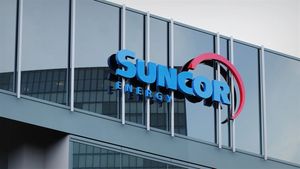Financial News
Datopotamab Deruxtecan Combinations Showed Encouraging Tumor Responses in Patients with Advanced Non-Small Cell Lung Cancer in TROPION-Lung02 Phase 1b trial
- In previously untreated patients, Daiichi Sankyo and AstraZeneca’s datopotamab deruxtecan plus pembrolizumab with or without platinum chemotherapy demonstrated objective response rates of 57% and 50%, respectively, with a disease control rate of 91% across cohorts
- Three ongoing pivotal trials are evaluating datopotamab deruxtecan and immune checkpoint inhibitor combinations in first-line non-small cell lung cancer
Updated results from the TROPION-Lung02 phase 1b trial showed that with additional enrollment and follow-up from the initial presentation datopotamab deruxtecan (Dato-DXd) in combination with pembrolizumab with or without platinum-based chemotherapy demonstrated promising clinical activity and no new safety signals in both previously untreated or pretreated patients with advanced or metastatic non-small cell lung cancer (NSCLC) without actionable genomic alterations (AGAs). Results will be presented on June 6 during an oral presentation (#9004) at the American Society of Clinical Oncology Annual Meeting (#ASCO23).
Datopotamab deruxtecan is a specifically engineered TROP2 directed DXd antibody drug conjugate (ADC) being jointly developed by Daiichi Sankyo (TSE: 4568) and AstraZeneca (LSE/STO/Nasdaq: AZN).
More than one million people are diagnosed with NSCLC at an advanced stage each year.1,2 While first-line treatment with immune checkpoint inhibitors with or without chemotherapy has improved outcomes for patients with NSCLC without AGAs, like EGFR or ALK, most patients eventually experience disease progression.3,4,5 TROP2 is a protein expressed in more than 90% of NSCLC tumors.6 There are currently no TROP2 directed ADCs approved for the treatment of lung cancer.7,8
Across previously untreated and pretreated patients, an objective response rate (ORR) of 38% was observed (95% confidence interval [CI]: 26-51) in patients receiving doublet datopotamab deruxtecan plus pembrolizumab (Merck & Co., Inc., Rahway, NJ, USA), an anti-PD-1 therapy. In patients receiving triplet datopotamab deruxtecan plus pembrolizumab and platinum chemotherapy, an ORR of 49% was observed (95% CI: 37-61). Disease control rates (DCR) of 84% and 87% were observed in the doublet and triplet cohorts, respectively. Median duration of response (DoR) was not reached across cohorts. Although immature, median progression-free survival (PFS) was 8.3 months (95% CI: 6.8-11.8) in the doublet cohort and 7.8 months (95% CI: 5.6-11.1) in the triplet cohort. Response rates were highest in previously untreated patients with ORRs of 50% (95% CI: 32-68) and 57% (95% CI: 42-70) observed in the doublet and triplet cohorts, respectively, with a consistent DCR of 91% observed across cohorts.
“Nearly all patients with advanced non-small cell lung cancer experience disease progression following initial therapy, underscoring the need for novel therapeutic approaches across treatment lines,” said Yasushi Goto, MD, Division of Internal Medicine and Thoracic Oncology, National Cancer Center Hospital, Tokyo, Japan. “The updated results from TROPION-Lung02 signal the potential for datopotamab deruxtecan combinations to improve outcomes for patients with non-small cell lung cancer and are a promising development in the pursuit of a new standard treatment option beyond immunotherapy.”
The safety profiles of datopotamab deruxtecan-based combinations were consistent with previous data with no new safety signals observed. Grade 3 or greater treatment-related adverse events (TRAEs) occurred in 31% of patients receiving doublet therapy and 58% of patients receiving triplet therapy. The most frequent adverse events of any grade in the doublet and triplet cohorts, respectively, were stomatitis (56% and 35%), nausea (41% and 47%), anemia (21% and 48%) and fatigue (31% and 37%). Across treatment cohorts, there were 27 interstitial lung disease (ILD) or pneumonitis events adjudicated as drug-related by an independent committee. The percentage of ILD or pneumonitis events was similar across cohorts. The majority of ILD or pneumonitis events were low grade with 23 grade 1 or grade 2 and four grade 3 events. No grade 4 or grade 5 ILD or pneumonitis events or grade 5 TRAEs were observed.
“We continue to be encouraged by the findings from TROPION-Lung02, the first trial to evaluate the combination of a TROP2 directed antibody drug conjugate and an immune checkpoint inhibitor with or without platinum chemotherapy in patients with advanced non-small cell lung cancer,” said Mark Rutstein, MD, Global Head, Oncology Clinical Development, Daiichi Sankyo. “These data, alongside previous results for datopotamab deruxtecan combined with an immune checkpoint inhibitor, reinforce the potential of these combinations to improve outcomes for patients with different advanced cancers.”
“With more patients and nearly a year of additional follow-up, the updated TROPION-Lung02 results show that datopotamab deruxtecan continues to elicit promising and durable responses in a diverse subset of patients with non-small cell lung cancer,” said Cristian Massacesi, MD, Chief Medical Officer and Chief Development Officer, Oncology, AstraZeneca. “These early data give us confidence in the ongoing phase 3 development program evaluating datopotamab deruxtecan combinations as potential first-line treatment options for patients with advanced lung cancer across tumor histologies and PD-L1 expression levels.”
In the doublet cohort of TROPION-Lung02, 58% of patients were previously untreated and 42% were previously treated with platinum chemotherapy (38%) or immunotherapy (19%). In the triplet cohort, 75% of patients were previously untreated and 25% were previously treated with platinum chemotherapy (24%) or immunotherapy (25%). Eighty percent of patients in the doublet cohort and 73% of patients in the triplet cohort had PD-L1 tumor proportion scores of less than 50%, including 36% and 40% of patients who had PD-L1 tumor proportion scores of less than 1% in the doublet and triplet cohorts, respectively. As of the April 7, 2023 data cut-off, 36% and 46% of patients remained on the doublet and triplet therapy, respectively.
Summary of Efficacy Results
Overall Population |
||
|
Doublet (n=64) |
Triplet (n=72) |
Study Duration (range) |
14.8 months (1-30.2) |
12.9 months (2.6-23.4) |
Efficacy Measure |
Doublet (n=61) |
Triplet (n=71) |
ORR, %i (confirmed and pending) (95% CI) |
38% (n=23) (26-51) |
49% (n=35) (37-61) |
CR, % (confirmed) |
0% (n=0) |
1% (n=1) |
CR, % (pending confirmation) |
0% (n=0) |
0% (n=0) |
PR, % (confirmed) |
34% (n=21) |
48% (n=34) |
PR, % (pending confirmation) |
3% (n=2) |
0% (n=0) |
SD, % |
49% (n=30) |
38% (n=27) |
Median DoR (months) (95% CI) |
NE (8.8-NE) |
NE (5.8-NE) |
Median PFS (months) (95% CI) |
8.3 months (6.8-11.8) |
7.8 months (5.6-11.1) |
DCR, % ii |
84% (n=51) |
87% (n=62) |
First-Line Therapy |
||
Efficacy Measure |
Doublet (n=34) |
Triplet (n=53) |
ORR, %i (confirmed and pending) (95% CI) |
50% (n=17) (32-68) |
57% (n=30) (42-70) |
CR, % (confirmed) |
0% (n=0) |
2% (n=1) |
CR, % (pending confirmation) |
0% (n=0) |
0% (n=0) |
PR, % (confirmed) |
44% (n=15) |
55% (n=29) |
PR, % (pending confirmation) |
6% (n=2) |
0% (n=0) |
SD, % |
47% (n=16) |
34% (n=18) |
Median DoR (months) (95% CI) |
NE (5.5-NE) |
NE (5.7-NE) |
DCR, %ii |
91% (n=31) |
91% (n=48) |
CI, confidence interval; CR, complete response; DCR, disease control rate; DoR, duration of response; NE, not estimable; ORR, objective response rate; PFS, progression-free survival; PR, partial response; SD, stable disease |
||
iORR is CR + PR |
||
iiDCR is best overall response of confirmed CR + confirmed PR + SD |
||
Daiichi Sankyo and AstraZeneca have three phase 3 trials evaluating datopotamab deruxtecan as a potential first-line treatment option for patients with advanced or metastatic NSCLC without AGAs compared to the respective standard of care for the patient population of each study. TROPION-Lung07 is evaluating datopotamab deruxtecan plus pembrolizumab with or without chemotherapy in patients with non-squamous disease and PD-L1 expression of less than 50%. TROPION-Lung08 is evaluating datopotamab deruxtecan plus pembrolizumab in patients with PD-L1 expression of 50% or greater. AVANZAR is evaluating datopotamab deruxtecan plus durvalumab and platinum chemotherapy in patients regardless of PD-L1 expression or tumor histology.
About TROPION-Lung02
TROPION-Lung02 is an ongoing global, open-label, six-cohort phase 1b trial evaluating the safety and efficacy of datopotamab deruxtecan at two dose levels (4 mg/kg and 6 mg/kg) in combination with pembrolizumab (200 mg) with or without four cycles of platinum chemotherapy (carboplatin or cisplatin) in patients with previously untreated or pretreated advanced or metastatic NSCLC without AGAs (e.g., EGFR, ALK, ROS1, NTRK, BRAF, RET, MET or other known AGAs).
The primary endpoints of TROPION-Lung02 are dose-limiting toxicities and treatment-emergent adverse events. Secondary endpoints include ORR, DoR, PFS as assessed by investigator, overall survival, pharmacokinetics and anti-drug antibodies for datopotamab deruxtecan and pembrolizumab.
TROPION-Lung02 is one of three clinical trials, alongside TROPION-Lung07 and TROPION-Lung08, in a collaboration and supply agreement between Daiichi Sankyo, AstraZeneca and a subsidiary of Merck & Co., Inc., Rahway, NJ., USA to evaluate the combination of datopotamab deruxtecan and pembrolizumab.
About Non-Small Cell Lung Cancer
More than one million people are diagnosed with advanced stage NSCLC each year.1,2 While targeted therapies and immune checkpoint inhibitors have improved patient outcomes, advanced NSCLC has a poor prognosis and is associated with worsening outcomes after each line of subsequent therapy.3,4,5
Most patients with NSCLC have tumors that do not express a known AGA (e.g., EGFR, ALK, ROS1, NTRK, BRAF, RET or MET).9,10,11 The current first-line standard of care for these patients is immune checkpoint inhibitors with or without platinum-based chemotherapy. Approximately 40% to 60% of tumors will not respond to this initial treatment and while these therapies may improve survival for patients whose tumors do respond, most will experience disease progression.5,7
TROP2, a transmembrane glycoprotein, is expressed in more than 90% of NSCLC tumors.6 There are currently no TROP2 directed ADCs approved for the treatment of lung cancer.
About the Daiichi Sankyo and AstraZeneca Collaboration
Daiichi Sankyo and AstraZeneca entered into a global collaboration to jointly develop and commercialize ENHERTU in March 2019 and datopotamab deruxtecan in July 2020, except in Japan where Daiichi Sankyo maintains exclusive rights for each ADC. Daiichi Sankyo is responsible for the manufacturing and supply of ENHERTU and datopotamab deruxtecan.
About Datopotamab Deruxtecan (Dato-DXd)
Datopotamab deruxtecan (Dato-DXd) is an investigational TROP2 directed ADC. Designed using Daiichi Sankyo’s proprietary DXd ADC technology, datopotamab deruxtecan is one of the three lead ADCs in the oncology pipeline of Daiichi Sankyo, and one of the most advanced programs in AstraZeneca’s ADC scientific platform. Datopotamab deruxtecan is comprised of a humanized anti-TROP2 IgG1 monoclonal antibody, developed in collaboration with Sapporo Medical University, attached to a number of topoisomerase I inhibitor payloads, an exatecan derivative, via tetrapeptide-based cleavable linkers.
A comprehensive development program called TROPION is underway globally with more than 12 trials evaluating the efficacy and safety of datopotamab deruxtecan across multiple tumors, including NSCLC, triple negative breast cancer and hormone receptor positive, HER2 low or negative breast cancer. Beyond the TROPION program, datopotamab deruxtecan is also being evaluated in novel combinations in several ongoing trials.
About the DXd ADC Portfolio of Daiichi Sankyo
The DXd ADC portfolio of Daiichi Sankyo currently consists of five ADCs in clinical development across multiple types of cancer. The company’s clinical trial stage DXd ADCs include ENHERTU, a HER2 directed ADC, and datopotamab deruxtecan (Dato-DXd), a TROP2 directed ADC, which are being jointly developed and commercialized globally with AstraZeneca; and patritumab deruxtecan (HER3-DXd), a HER3 directed ADC. Two additional ADCs including ifinatamab deruxtecan (I-DXd; DS-7300), a B7-H3 directed ADC, and raludotatug deruxtecan (R-DXd; DS-6000), a CDH6 directed ADC, are being developed through a strategic early-stage research collaboration with Sarah Cannon Research Institute.
Designed using Daiichi Sankyo’s proprietary DXd ADC technology to target and deliver a cytotoxic payload inside cancer cells that express a specific cell surface antigen, each ADC consists of a monoclonal antibody attached to a number of topoisomerase I inhibitor payloads (an exatecan derivative, DXd) via tetrapeptide-based cleavable linkers.
Datopotamab deruxtecan, ifinatamab deruxtecan, patritumab deruxtecan and raludotatug deruxtecan are investigational medicines that have not been approved for any indication in any country. Safety and efficacy have not been established.
About Daiichi Sankyo
Daiichi Sankyo is dedicated to creating new modalities and innovative medicines by leveraging our world-class science and technology for our purpose “to contribute to the enrichment of quality of life around the world.” In addition to our current portfolio of medicines for cancer and cardiovascular disease, Daiichi Sankyo is primarily focused on developing novel therapies for people with cancer as well as other diseases with high unmet medical needs. With more than 100 years of scientific expertise and a presence in more than 20 countries, Daiichi Sankyo and its 17,000 employees around the world draw upon a rich legacy of innovation to realize our 2030 Vision to become an “Innovative Global Healthcare Company Contributing to the Sustainable Development of Society.” For more information, please visit: www.daiichisankyo.com.
References
1 Siegel R, et al. CA Cancer J Clin. 2021;71:7-33.
2 World Health Organization. International Agency for Research on Cancer. Lung Fact Sheet. Accessed June 2023.
3 Shields MD, et al. Am Soc Clin Oncol Educ Book. 2021;41:1-23.
4 Walsh RJ, et al. Ther Adv Med Oncol. 2020;12:1758835920937902.
5 Paz-Ares L, et al. J Thorac Oncol. 2020 Oct;15(10):1657-1669.
6 Mito R, et al. Pathol Int. 2020;70(5):287-294.
7 Rodríguez-Abreu D et al. Ann Onc. 2021 Jul;32(7):881-895.
8 American Cancer Society. Targeted Drug Therapy for Non-Small Cell Lung Cancer. Accessed June 2023.
9 Chen R, et al. J Hematol Oncol. 2020;13(1):58.
10 Majeed U, et al. J Hematol Oncol. 2021;14(1):108.
11 Adib E, et al. Genome Med. 2022;14(1):39.
View source version on businesswire.com: https://www.businesswire.com/news/home/20230603005017/en/
Contacts
Global:
Jennifer Brennan
Daiichi Sankyo, Inc.
jbrennan2@dsi.com
+1 908 900 3183 (mobile)
Japan:
Koji Ogiwara
Daiichi Sankyo Co., Ltd.
ogiwara.koji.ay@daiichisankyo.co.jp
+81 3 6225 1126 (office)
Investor Relations Contact:
DaiichiSankyoIR@daiichisankyo.co.jp
More News
View More





Quotes delayed at least 20 minutes.
By accessing this page, you agree to the following
Privacy Policy and Terms Of Service.



